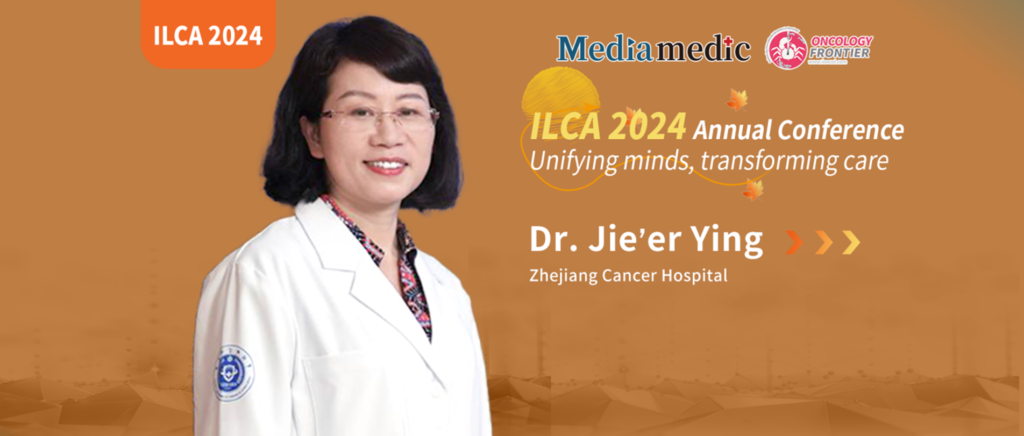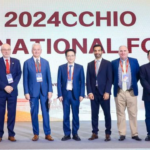
Editor’s Note: The 2024 CACA Integrative Gastric Cancer Conference took place in Wuhan from October 18-19, 2024. Oncology Frontier invited Dr. Jie’er Ying, Chairman of the Chinese Anti-Cancer Association’s Gastric Cancer Integrative Rehabilitation Committee and Head of the Hepatobiliary and Gastric Oncology Department at Zhejiang Cancer Hospital, to discuss the current state and development of integrative rehabilitation for gastric cancer.Oncology Frontier: During the 2024 CACA Integrative Gastric Cancer Conference, you delivered a keynote report on the “Current State and Development of Integrative Rehabilitation for Gastric Cancer.” Could you briefly explain the concept of integrative rehabilitation and the current status of gastric cancer integrative rehabilitation?
Dr. Jie’er Ying: Gastric cancer has a high incidence in China, with most patients diagnosed at advanced stages, leading to a generally poor survival rate. However, advancements in anti-tumor therapies, including surgical innovations, radiation technology upgrades, and developments in pharmacotherapy, have significantly improved the prognosis and extended survival for gastric cancer patients.
Despite these advancements, the side effects of anti-tumor treatments on various organs, along with the psychological pressure and financial burdens on families, have highlighted an increased need for comprehensive rehabilitation as patients’ survival times extend. Rehabilitation encompasses a wide range of disciplines, including nutrition, exercise, psychology, and traditional Chinese medicine, as well as supportive therapies like music therapy, all of which play essential roles in patient recovery. Hence, we emphasize multidisciplinary support and full-process management.
Traditionally, rehabilitation focused on specific disciplines, such as nutrition, exercise, or psychology. Now, however, we are shifting towards integrating various rehabilitation modes to provide patients with a holistic rehabilitation plan, ultimately enhancing their quality of life. Numerous studies in recent years indicate that multimodal rehabilitation has direct positive effects on patients’ physical health, improving their physical and psychological state while enhancing the effectiveness of ongoing anti-tumor therapies. The future will see more research and practice in this field, driving the development of rehabilitation treatments to achieve better outcomes and quality of life for patients.
Oncology Frontier: You initiated a clinical study on integrative gastric cancer rehabilitation that has positively impacted treatment outcomes. Could you share some of the findings and your plans for translating these results into clinical practice to benefit more patients?
Dr. Jie’er Ying: In the past two years, we have primarily focused on anti-tumor treatments, particularly as part of the Hepatopancreatobiliary and Gastric Oncology Department. However, as these therapies progress, we are also identifying challenges in rehabilitation, including issues related to patients’ nutritional status, physical activity, and psychological stress.
Currently, through the Chinese Anti-Cancer Association’s Gastric Cancer Integrative Rehabilitation Committee platform, we initiated a clinical study on integrative rehabilitation to assess its impact on adjuvant therapy after gastric cancer surgery. With only 30% to 50% of patients completing the standard eight-cycle postoperative chemotherapy, we hope that multimodal rehabilitation, encompassing nutrition, exercise, and psychological support, can improve chemotherapy completion rates and thus enhance patient prognoses. This study is underway, and we expect more detailed data by next year.
Implementing integrative rehabilitation in clinical settings remains challenging due to the involvement of various disciplines such as exercise, nutrition, and psychology. Each field requires its own expertise, and managing these interdisciplinary approaches for a single patient remains complex. Additionally, most patients spend a significant amount of time outside the hospital, making it essential to support integrative rehabilitation practices at home. In many local hospitals, the concept of rehabilitation and implementation measures need to be strengthened. This field has much to offer, though it also presents significant challenges. Looking forward, I hope to work with colleagues nationwide to enhance integrative rehabilitation efforts through the committee’s platform and expand awareness and understanding across healthcare providers.
Oncology Frontier: As Chairman of the Gastric Cancer Integrative Rehabilitation Committee, could you share your future plans?
Dr. Jie’er Ying: Since the establishment of the Gastric Cancer Integrative Rehabilitation Committee, we have set several goals. First, we will focus on raising awareness and educating the public. Although the concept of integrative rehabilitation has gained attention in recent years, its widespread application and understanding still need to improve. We plan to engage in extensive public education efforts to help healthcare providers and patients better understand the scope and significance of integrative rehabilitation, encouraging patient involvement in the rehabilitation process.
Additionally, we aim to promote integrative rehabilitation case competitions. We have already held several grassroots competitions and completed beginner, intermediate, and advanced training programs. These activities have helped hospitals enhance their understanding and implementation of integrative rehabilitation practices. Moving forward, we will continue to hold more competitions and training sessions to facilitate experience exchange and skill enhancement nationwide.
Moreover, we plan to conduct clinical studies, particularly on integrative rehabilitation in postoperative adjuvant therapy for gastric cancer. Our objective is to use scientific data to demonstrate the benefits of integrative rehabilitation, ultimately improving adjuvant chemotherapy completion rates and patient outcomes.
Finally, we will focus on developing guidelines and standards for integrative rehabilitation. By compiling and disseminating these guidelines, we aim to provide standardized integrative rehabilitation protocols to medical institutions nationwide, further advancing the overall level of integrative rehabilitation.
Dr. Jie’er Ying, Chief Physician
Dr. Jie’er Ying is the Department Head of Hepatobiliary and Gastric Oncology at the Cancer Hospital of the Chinese Academy of Sciences (Zhejiang Cancer Hospital). He holds key roles in various prestigious associations, including:
- Chairman of the Gastric Cancer Integrative Rehabilitation Committee, Chinese Anti-Cancer Association (CACA)
- Committee Member of the Targeted Therapy Committee, CACA
- Committee Member of the Colorectal Cancer Committee, CACA
- Committee Member of the Gastric Cancer Committee, CACA
- Member of the Surgery Branch MDT Committee, Chinese Medical Doctor Association
- Executive Committee Member of the CSCO Gastric Cancer Committee
- Executive Committee Member of the CSCO Cholangiocarcinoma Committee
- Committee Member of the CSCO Liver Cancer Committee
- Committee Member of the CSCO Colorectal Cancer Committee
- Chairman of the Zhejiang Anti-Cancer Association’s Tumor Metastasis Committee
- Vice Chairman of the Zhejiang Anti-Cancer Association’s Oncology Department Committee
- Vice Chairman of the Zhejiang Anti-Cancer Association’s Tumor Nutrition Support Committee
- Vice Chairman of the Tumor Nutrition and Therapeutics Branch, Zhejiang Medical Association
- Vice Chairman of the Tumor Precision Treatment Committee, Zhejiang Medical Doctor Association
Prof. Ying’s expertise lies in the comprehensive treatment and clinical translational research of gastric cancer, colorectal cancer, and other gastrointestinal malignancies.


